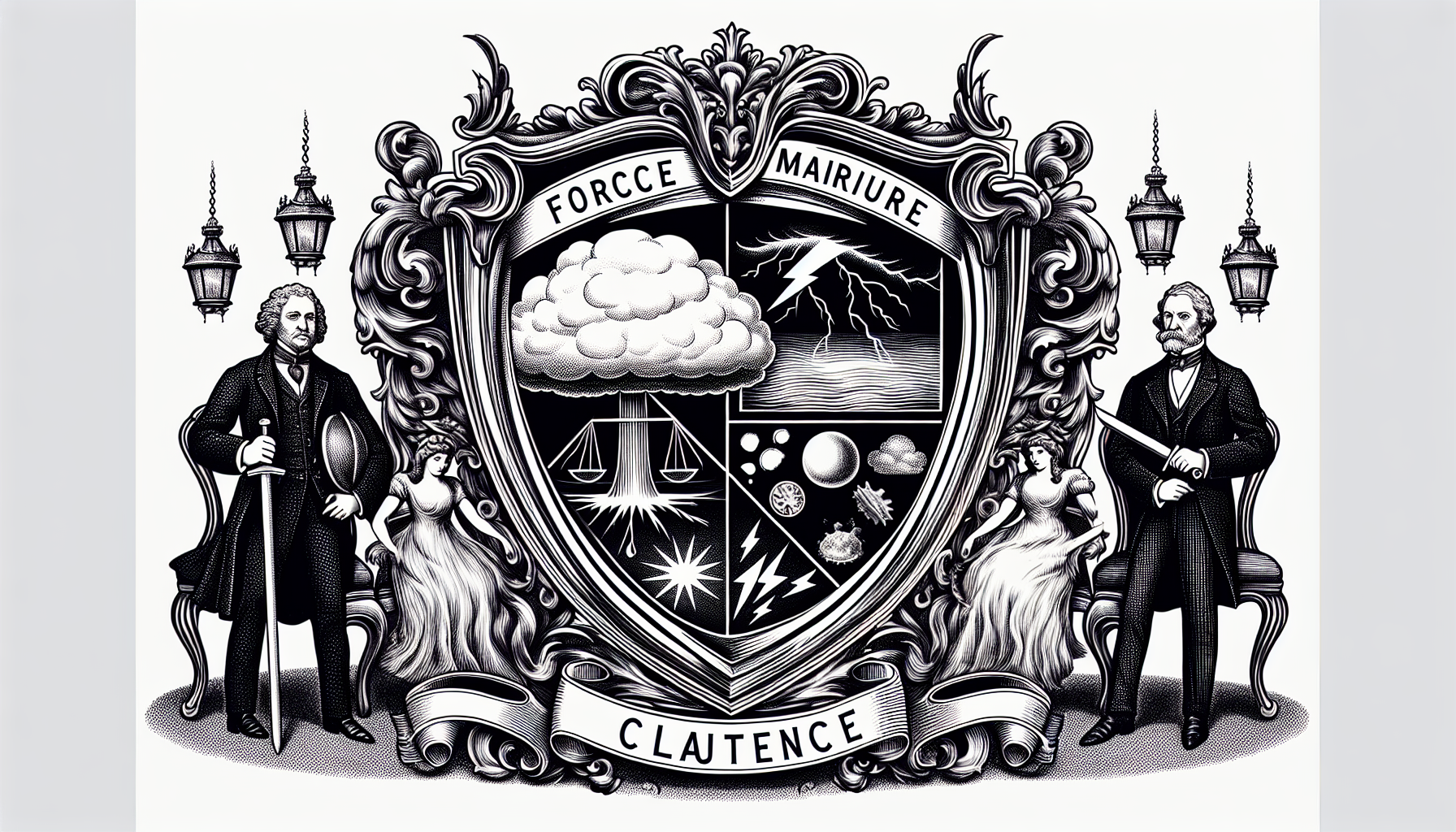Malcolm ZoppiWed May 08 2024
Essential Guide to Navigating Your Contract Obligation Responsibilities
Understanding and fulfilling your contract obligation is a binding aspect of any agreement. This article provides a clear roadmap to navigate the intricacies of contractual duties, steers you away from potential legal pitfalls, and introduces tools for effective management. Expect insights without the jargon, focused on ensuring you can confidently uphold your end of any […]
Understanding and fulfilling your contract obligation is a binding aspect of any agreement. This article provides a clear roadmap to navigate the intricacies of contractual duties, steers you away from potential legal pitfalls, and introduces tools for effective management. Expect insights without the jargon, focused on ensuring you can confidently uphold your end of any deal.
Key Takeaways
Contractual obligations define each party’s responsibilities within a contract and can have severe consequences if not met, impacting financial, operational, and reputational aspects of the involved entities.
Detailed contract clauses regarding payment terms, delivery, performance, confidentiality, and non-compete are essential to ensure clear expectations, minimize disputes, and safeguard sensitive business information.
Proactive contract management through regular reviews, use of Contract Lifecycle Management software, and seeking legal advice in case of breaches are critical for reducing risks and ensuring the smooth operation of business transactions.
Understanding Contractual Obligations: A Primer

The responsibilities and duties of each party within an agreement are outlined by contractual obligations that serve as a crucial element. By forming these obligations, all involved parties ensure adherence to their respective parts of the deal. When contractual obligations are created, they establish what is expected from each party in order for the contract’s aims to be achieved. These stipulations may require certain actions or might prohibit others, and can either be continuous or tied to distinct timelines or milestones.
Consider contracts as reciprocal arrangements: while one entity commits to supplying products, another corresponds with payment. This exchange of goods, services, or other values underpins most contract obligations across a diverse array of agreements including employment contracts, licensing deals and investment terms sheets.
Should any obligation go unmet there could be significant repercussions which include:
Incurring penalties leading up to contract termination
Enduring financial losses
Experiencing operational hindrances
Suffering harm towards one’s professional standing
In light of such potential consequences arising from not meeting your commitments within contracts, it is essential that these responsibilities are fulfilled diligently.
The Foundation of Business Relationships
Delving deeper, the key takeaways from understanding contractual obligations serve as the foundation for establishing trust and anticipated standards in business interactions. Consider a contract to be an agreement of commitments among involved parties. Adherence to these obligations by any party reflects positively on its dependability and ethical standing. This adherence substantially reduces the potential hazards related to legal conflicts and unfulfilled agreements.
When all involved entities abide by their contractual responsibilities, it results in a transparent awareness of each party’s duties within the arrangement. This clarity is instrumental in enabling seamless and effective execution of business activities.
Legally Binding Nature of Contractual Obligations
When one party falls short in fulfilling their responsibilities under a contract, the issue of enforcing contractual obligations becomes pivotal. Every legally binding contract established and accepted by involved parties demands adherence to its specified terms from either an effective date mentioned or from the moment it is executed. This enforceability doesn’t just happen on its own. Legal experts must verify that the language within the document is legally sound to ensure that it can be enforced.
Within each agreement are two primary roles: the obligor, whose duty is to meet their end of the contractual obligation, and the obligee, who is entitled to have that obligation fulfilled. Should a party fail at carrying out these duties as outlined in contracts, then they risk being sued for breach of contract by those left without fulfillment—as both workers and employers hold rights to take action against breaches. There may also be certain obligatory stipulations mandated within some contracts designed specifically to satisfy particular legal requirements such as compliance with data protection statutes through proper inclusion of data processing clauses.
Deciphering the Terms: The Anatomy of Contract Obligations

Grasping the essence and significance of contractual obligations paves the way for a deeper understanding of their complexities. A carefully crafted contract encapsulates all vital elements pertaining to the business engagement, stipulating unambiguous payment terms, thorough conditions for termination, and specified limitations on liability. Yet what is the meaning behind these provisions and how do they influence those bound by them?
Take ‘profits’ as an example. This term should be explicitly spelled out within the contract so that parties shoulder clear-cut duties directly relevant to their particular commercial endeavor. Contracts must also:
Mandate evidence confirming services have been performed
Outline accepted payment methods from the billed entity
Maintain precise documentation like submission and receipt dates for drawings and papers necessary to support claims.
The introductory recitals in contracts shouldn’t be overlooked either—they establish crucial background information which aids in deciphering contractual intent—an aspect immensely crucial if disagreements arise or legal interpretation becomes necessary. Routine exhaustive examinations of contracts are instrumental in ensuring:
Outmoded clauses are updated
Ambiguities prone to misconceptions are made clearer
Contractual agreements see enhancements
Issues relating to allocation of risk come into light.
Payment Terms Explained
Starting with payment terms is advisable, as they should unambiguously specify all associated costs including hourly rates or the full amount for project finalization. It’s typical for contractors to receive payment for their invoices within a standard period of 30 days, but this can vary if an alternative arrangement has been established.
Negotiating more prompt payment terms can be beneficial for contractors because it enhances their cash flow and also acts as a measure of a client’s dependability.
Delivery and Performance Clauses

The next topic to tackle should be the delivery and performance stipulations. These are critical as they outline the obligations regarding the timing, place, and terms under which goods or services must be delivered. Essentially, these clauses set forth clear expectations about when, where, and in what manner delivery of goods or services is to occur for transactions to conclude efficiently and satisfactorily.
Confidentiality and Non-Compete Provisions
Lastly, and of no lesser significance, are the confidentiality and non-compete clauses. These sections play a pivotal role in securing proprietary business intelligence and preventing its distribution to unapproved entities. Through restrictive covenants, businesses can impose constraints on employees’ conduct that might otherwise be detrimental to their interests.
Implicit within these contracts is an assumed responsibility for good faith, which serves as a guard over confidential material and trade secrets accessed by workers throughout their period of employment. Non-disclosure commitments serve to stop the unwarranted spread of sensitive data, while non-compete obligations restrict individuals from engaging in competition with their employer during—and occasionally following—their service tenure.
Crafting and Managing Contractual Obligations with Precision
It is essential to delve into the creation and maintenance of contractual obligations with precision. To achieve clear contracts and eliminate uncertainty, one should employ simple language and steer clear of convoluted or elaborate phrasing.
Before committing to a contract with a signature, it’s critical to perform thorough reviews of the agreement to confirm its strength, adherence to legal standards, and that it lessens financial hazards. Utilizing a checklist during contract review can serve as an organized approach ensuring every element of the contract receives careful scrutiny without overlooking any particulars.
Tailoring Obligations to Specific Business Needs
Contractual obligations vary significantly, and it is crucial to recognize that a universal approach does not suit every scenario. Gaffney Zoppi excels in the creation of customized contracts for small UK businesses, designed meticulously to cater to the unique needs of each client. These tailor-made agreements can define business-specific risks, establish precise payment terms, set forth conditions regarding contract termination, and delineate liability should non-delivery occur.
Securing a custom-designed contract from experts such as Gaffney Zoppi offers assurance by establishing definite obligations which help minimize conflicts while simultaneously supporting alignment with business goals.
Avoiding Ambiguity: The Importance of Clear Communication
Ensuring that contracts are free of ambiguity and clear in their language is a vital part of handling contractual obligations. It’s essential to employ precise terminology when drafting contracts to sidestep potential misunderstandings or communication breakdowns. Terms that could lead to ambiguity should be shunned, while the application of conjunctions and modifiers needs to be unambiguous.
Robust tools for contract management software can issue prompt notifications that help forestall disagreements, guaranteeing that the responsibilities within a contract are established with certainty.
The Role of Contract Lifecycle Management Software

The introduction of technology has revolutionized the contract management process by utilizing Contract Lifecycle Management (CLM) software, which helps to streamline obligations and enhance business performance. Leading platforms like CobbleStone Software provide a wealth of features that assist in various aspects including:
Managing requests
Creating contracts
Conducting negotiations
Enabling collaboration
Overseeing compliance issues
Monitoring costs
Providing timely alerts and notifications through AI-enhanced systems and machine learning capabilities
They support electronic signature integration for modern contracting needs.
Applying artificial intelligence to analyze contracts yields numerous advantages such as diminishing human error, boosting operational efficiency, delivering critical business insights, and facilitating effective oversight with reminders for managing crucial deadlines within the contract lifecycle.
Advanced CLM solutions are designed to offer automated email and calendar reminder functions to ensure timely activations of required approvals and relevant notices according to each organization’s specific requirements.
Platforms such as Juro Enhance this domain by providing opportunities for real-time teamwork among stakeholders. They improve workflow processes related to contracts while maintaining comprehensive records of edits — thus guaranteeing an audit-ready trail. These platforms uphold legal compliances effectively by incorporating necessary contract terms custom-fitted per agreement.
Ultimately employing CLM software translates into superior control over contractual conditions ensuring seamless operation across different facets of businesses.
Navigating Contract Breaches and Legal Remedies
Upon traversing the complexities of contractual obligations and examining strategies for their effective handling, it’s imperative to consider potential complications. Specifically, when a party defaults on fulfilling their duties within a contract, it can give rise to several issues such as:
Initiation of legal proceedings
Erosion of trust between parties
Economic damages suffered by the aggrieved party
Various other forms of conflict
In response to failures in meeting contract obligations, the available judicial recourse comprises measures like reimbursing monetary losses incurred due to breach. Enforcing specific performance—that is compelling fulfillment exactly as agreed in the contract. Or possibly dissolving the contractual agreement altogether.
Seeking Legal Advice: When and Why?
If you find yourself entangled in a dispute over contracts or require clarity regarding your legal obligations, it’s prudent to consult with an attorney. Lawyers with expertise can help draft enforceable contracts that adhere to all pertinent laws and advise on the best course of action and potential remedies should there be any breach of contract.
For expert guidance in managing breaches and achieving resolutions, especially when confronted by a breaching party, Gaffney Zoppi is available for professional consultation.
Remedies for Non-Fulfillment: Financial Damages and Beyond
Should breaches occur within a contract, various legal solutions are at one’s disposal. These may include the imposition of financial damages, commanding specific performance, or sanctioning the termination of the contract itself. To grasp what remedies might be applicable in instances of breach of contract, it is imperative to first examine the stipulations laid out in the agreement. Such an examination is essential to ascertain which routes can be pursued when dealing with a breach.
Collaborative Problem Solving vs. Litigation
Although sometimes initiating legal proceedings is required, it isn’t invariably the preferred or initial strategy. Methods of alternative dispute resolution like negotiation and mediation tend to be promoted ahead of litigation due to their potential in conserving time and resources. Every scenario is distinct, making it critical to evaluate all possible choices carefully.
When Unforeseen Circumstances Challenge Contractual Duties
In the unpredictable realm of business, events beyond our control can upend even the most meticulously devised contract obligations. Global crises or abrupt shifts in market dynamics are prime examples of circumstances that test established contractual agreements.
Should a force majeure event occur, it may still be feasible for a party to fulfill some elements of their financial commitments as a means to mitigate damages—for instance, by settling part of an invoice payment. It’s common for contracts to contain provisions permitting termination if such an event extends over time, thereby allowing involved parties the opportunity to pursue other options.
When faced with unexpected challenges, renegotiating terms within the existing contract or devising an alternate approach alongside the contracting partner could lead both entities toward a consensual resolution.
Force Majeure and Other Considerations

Clauses of force majeure in contracts are established to protect parties from being held accountable for not performing their obligations due to exceptional events beyond their control, including:
natural disasters
pandemics
terrorism
labor strikes
government actions
In response to the evolving nature of global circumstances, these provisions have adapted over time. They now encompass a wider array of modern disruptions alongside classic acts of God, illustrating how they have progressed with the changing times.
Renegotiating Obligations: A Step-by-Step Guide
When unforeseen circumstances arise, renegotiation may be a viable option. Starting the renegotiation process requires a clear vision and understanding of both parties’ interests, as well as setting and prioritizing the objectives for negotiation. To avoid deadlock situations during renegotiations, divide the contract obligations into separate components that can be negotiated independently.
Employing a business-centered negotiation strategy that includes the use of data to support claims and showing appreciation for the other party helps achieve mutually beneficial outcomes.
Best Practices for Ongoing Contractual Obligation Management
In closing, let’s delve into the optimal strategies for overseeing contractual duties. Vigilant supervision and prompt responses are essential when obligations outlined in a contract go unmet to reduce potential losses or damages. Routine audits conducted by contract attorneys, like those at Gaffney Zoppi, ensure that documentation remains top-notch—a vital aspect of reducing risk and fostering business expansion.
The clear-cut pricing structure offered by Gaffney Zoppi for their legal services on contracts presents businesses with an economical and straightforward approach while they handle continuous contractual responsibilities. When facing unforeseen obstacles, parties involved in a contract should engage proactively to explore viable options and modify their approach to managing the contract as needed.
Regular Reviews and Updates
Periodically examining the terms of a contract can help ensure that it remains pertinent despite any shifts in the business landscape. By conducting routine evaluations of contracts, parties have an opportunity to enhance their agreements through the integration of contemporary industry standards and methodologies. Such reviews may also uncover instances where contractual modifications are required due to alterations in laws or regulations affecting its provisions.
As objectives evolve for the entities engaged in a contract, there might be a need to modify its contents so as to preserve congruence and efficacy between all parties involved. It is advisable that contracts should contain clauses delineating both when these assessments ought to take place and how they should be executed, with clear responsibilities assigned for who will oversee this essential process.
Documentation and Record-Keeping
The importance of documentation and record-keeping is frequently undervalued in the realm of contract management. Contracts usually require that records be kept, a responsibility often entrusted to a Contract Administrator. To allow an individual who is not familiar with the project to piece together what occurred, it’s critical to keep detailed contemporaneous records. The lack or inconsistency of such records can lead to unsuccessful claims or diminish their credibility.
Implementing contract lifecycle management software significantly improves supervision and organization when managing these vital documents, assuring that they are meticulously recorded following established procedures.
Summary
Navigating the labyrinth of contractual obligations may seem daunting, but with the right tools and strategies, it can become a manageable task. From understanding the fundamental nature of contractual obligations to crafting and managing them with precision, businesses can turn contracts into a strategic tool for driving growth and mitigating risks. Regularly reviewing and updating contracts, maintaining thorough documentation, and proactively addressing breaches and unforeseen challenges are crucial steps in effective contractual obligation management. Let’s remember, contracts are more than just paperwork; they are the lifeblood of business relationships.
Frequently Asked Questions
What does Gaffney Zoppi specialize in?
Gaffney Zoppi specializes in crafting bespoke contracts for UK small businesses.
What do Gaffney Zoppi’s contract review lawyers do?
Gaffney Zoppi’s contract review lawyers ensure that documents uphold the highest standards, reducing risks and promoting business growth by their work.
Who does Gaffney Zoppi work with and advise?
Zoppi Gaffney provides consultation and services to an extensive clientele comprising entrepreneurs, corporate executives such as shareholders and directors, business proprietors, professionals in the service industry, individual private clients, non-profit organizations, investors along with private equity companies.
How does Gaffney Zoppi ensure that contracts are tailored to specific business needs?
By dedicating time to thoroughly comprehend the client’s business objectives and obstacles, Gaffney Zoppi crafts contracts that are meticulously designed to meet specific needs. This commitment ensures that each contract is uniquely suited to address the particular requirements of the client’s business.
Are the fees for contract lawyer services fixed or hourly with Gaffney Zoppi?
Yes, Gaffney Zoppi offers fixed fees for their contract lawyer services, providing transparency and affordability for clients.